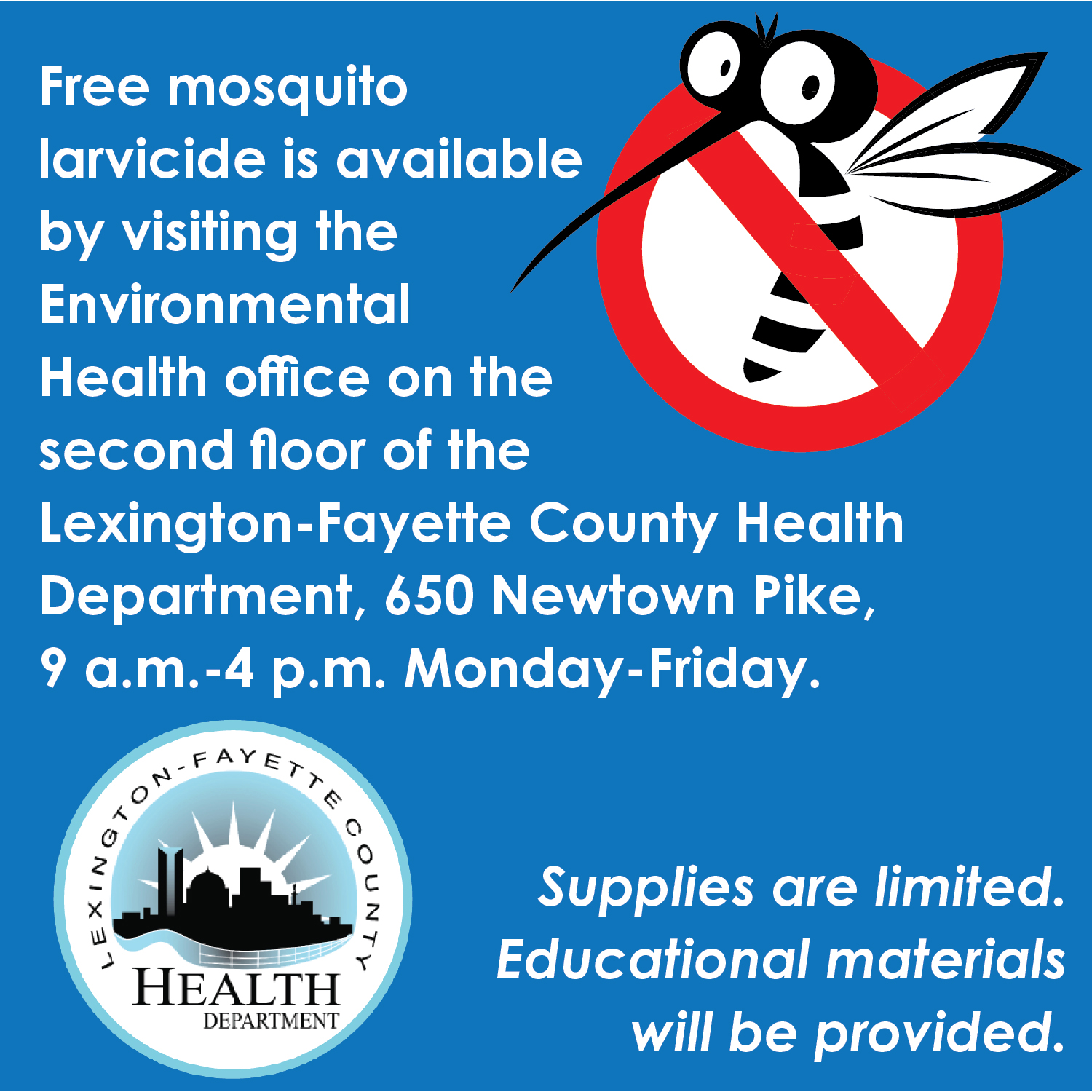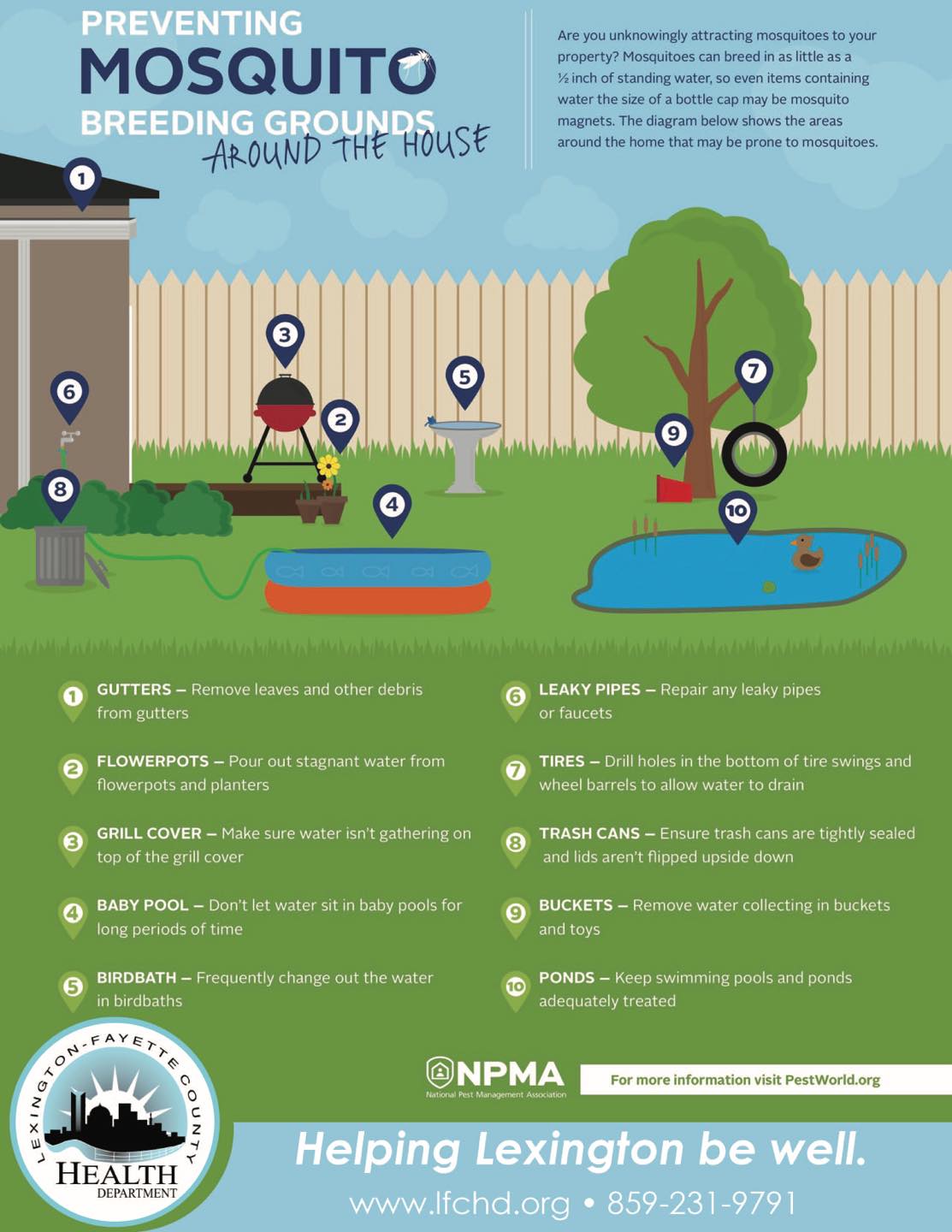This summer, the Lexington-Fayette County Health Department plans to control mosquito populations in the community by bringing increased focus to eliminating standing water and preventing mosquito larvae from hatching. This includes free mosquito larvicide, available by visiting the Environmental Health office on the second floor of the Lexington-Fayette County Health Department, 650 Newtown Pike, 9 a.m.-4 p.m. Monday-Friday. Supplies are limited. Educational materials will be provided.

The department will also use mosquito trapping to identify areas where spraying for adult mosquitos would be most useful. The health department has surveyed Lexington neighborhoods to identify and treat large areas of standing water that can serve as prime locations for mosquitoes to lay their eggs. Elimination of standing water is the ultimate goal, but in places where puddles exist, the water can be treated to kill mosquito larvae with a chemical called a larvicide.
“We are increasing activities to kill mosquito larvae in areas where standing water cannot be drained,” said Luke Mathis, Environmental Health and Preparedness team leader at LFCHD. “Targeting immature mosquitoes is a more effective control strategy as it stops mosquitoes from developing into adults that can feed on humans and transmit mosquito-borne diseases like Zika and West Nile.”
The health department will no longer conduct routine mosquito spraying for adult mosquitoes throughout the city on a regular cycle. Instead, mosquito traps will be placed in potential problem areas. If a certain threshold of mosquito activity is reached, the department will conduct targeted spraying in the appropriate areas. Those areas will be announced via the health department’s website, www.lfchd.org, and social media pages.
For spraying, the health department uses Duet, an EPA-approved agent that features a component that stimulates resting mosquitoes in trees and foliage, causing them to fly into the air and come into contact with the spray’s mosquito-killing agent, sumithrin. Duet has been rigorously tested for human and animal safety and is registered for outdoor residential and recreational areas.
Lexington residents can also take steps at home to fight mosquitoes:
● Mosquito-proof your home and yard. Fix or install window and door screens. Mosquitoes lay their eggs in standing water. Cover or eliminate empty containers with standing water. Limit the number of places around your home for mosquitoes to breed by getting rid of items such as tires, buckets, barrels and cans. Refresh the water in your pet’s water dishes and birdbaths at least every five to seven days.
● Be aware of peak mosquito activity times. The twilight hours around dusk and dawn are times of peak mosquito activity. Use insect repellent when outdoors especially during peak activity times, including early morning hours. Look for EPA-labeled repellents containing active ingredients, such as DEET, Picaridin (KBR3023) or oil of lemon eucalyptus (p-menthane 3,8-diol). Apply repellent according to label instructions. When weather permits, wear long sleeves, long pants and socks outdoors. Mosquitoes can bite through thin clothing, so spraying clothes with repellent containing permethrin or another EPA-registered repellent helps prevent bites.
“The battle against mosquitoes starts at every residence in Fayette County,” Mathis said. “By eliminating standing water, even something as small a capful of rain in your yard, you can remove areas for mosquitoes to lay eggs. It’s important for people to walk around their homes to see what they can do to help curb the mosquito population.”
To report a standing water problem in your neighborhood, please call the health department’s Environmental Health section at (859) 231-9791.

